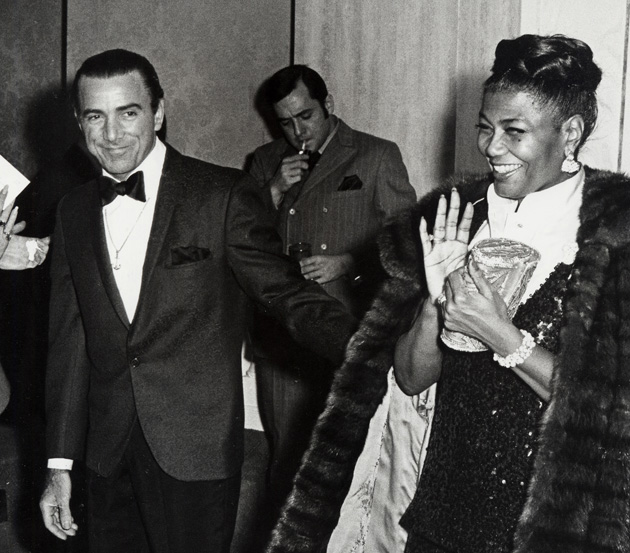Today interracial couples face little opposition from their families or society, and if they do, it’s those in opposition who are the odd ones out—not the couple. But an understanding that everybody should be allowed to follow their heart, wherever and to whomever it might take them, is a relatively new one in history. These 10 couples took a risk to be together. Compilation compliments of Listverse.com.
1. Pearl Bailey and Louie Bellson
Their successful careers in music brought them together — Bailey, a famous singer and Bellson, a famous drummer. On the fifth day of knowing each other, they got hitched in London. Bellson was already catching some flack for being the first white musician in Duke Ellington’s band, and he upset even more people when he became Bailey’s third husband. When touring the Southern states, Bellson would often lie and say Bailey was Haitian to deflect some aggression. The couple was married for 38 years and adopted two children.
2. Betty & Barney Hill
Betty & Barney were just an ordinary couple living in New Hampshire —Betty was a social worker and Barney worked at a post office — but one night, after seeing a strange bright light, the two both reported having dreams of being abducted by aliens. They went on record several times talking about the strange dreams and UFO sighting, but retreated into privacy when Barney feared the publicity would make their fight harder for equality as an interracial couple. A film, “Interrupted Journey,” was made about the famous UFO abductees in the 1960s.
3. Samuel Coleridge-Taylor and Jessie Walmisley
Famous British composer Coleridge-Taylor had a white mother and black father and grew up in the suburbs of London. He attended high school with pianist Walmisley, who he later married against her family’s wishes. The Walmisley family made several attempts to stop the marriage before finally accepting Coleridge-Taylor into their family, but the couple still received a lot of verbal attacks from local groups against interracial marriage.
4. Sammy Davis Jr. and May Britt
When famous entertainer Sammy Davis Jr. married Swedish actress May Britt, the majority of American states forbade interracial marriage. The couple was set to marry during the election of John F. Kennedy, but Kennedy’s father feared the marriage would mean the loss of votes, so Sammy Davis Jr. postponed the wedding until after the election. Frank Sinatra served as best man when the big day finally did arrive, and other stars were in attendance such as Shirley MacLaine and Dean Martin.
5. George Schuyler & Josephine Cogdell
Schuyler was a well-known left-wing journalist in the 1920s and Cogdell was a model-actress-dancer who came from a rich, former slave-owning family. Interested in left wing ideas, Cogdell began writing back and forth with Schuyler, who she eventually traveled to New York to meet and later marry. When they married, Cogdell wrote on the marriage certificate that she was colored to avoid any opposition. Schuyler eventually became a strong supporter of the right wing, believing blacks could only progress by working in cooperation with whites.
6. Jack Johnson and Wives 1 through 3
Jack Johnson spent plenty of time in the limelight as both a very successful boxer, and a performer for theater companies. The Jack-of-all-trades was married three times, each time to a white woman. They included Brooklyn socialite Etta Terry Duryea; Lucille Cameron, and Irene Pineau. Events surrounding each of these unions were very controversial, with Duryea committing suicide after rumors of Johnson abusing her and Cameron having been rumored to help Johnson pimp out prostitutes.
7. Frederick Douglass and Helen Pitts
After 38 years in slavery, Douglass escaped and married a free African American woman named Anna Murray. They had five children before Murray died and Douglass went on to marry white abolitionist and suffragist Helen Pitts. Douglass’ marriage represented the first of many times the great author and social reformer would stand up for American unity, but the couple received a lot of public criticism. Douglass died in 1895 of a heart attack on the same day he gave a speech advocating women’s right to vote.
8. Joseph Philippe Laroche and Juliette Lafargue
Haitian-born Laroche went to France at the age of 15 to study engineering, and there he met his future wife Lafargue. They had two children but supporting their family was a struggle for Laroche since at the time, well-paying jobs were reserved for whites. A series of events sent the family back to Haiti…on the Titanic. When the ship sank, Laroche got his wife and children safely onto a lifeboat, but he died. The Laroche family were the only people of black descent on the Titanic.
9. Sir Seretse Khama and Ruth Williams
Khama was the son of the ruler of what would eventually become Botswana. After his father died, Khama went to school in England where he met Williams, who he married a year later. Several members of the South African government and also of Khama’s tribe were outraged by the marriage, banning Khama from the chieftainship. Only when Khama agreed to renounce the tribal throne was he and his bride allowed into Botswana (then Bechuanaland). However, when the region gained its freedom and actually came to be called Botswana, Khama became the country’s first president and Williams proved to be a very impressive first lady.
10. Richard Loving and Mildred Jeter
Loving and Jeter met as children in Virginia, and when she was 18, Jeter became pregnant with Loving’s child. They moved to Washington, D. C. to get married but just five weeks after their wedding, were arrested for breaking the law against interracial marriage. Banned from the state of Virginia for 25 years, they weren’t going down without a fight. Jeter wrote a letter to Attorney General Robert F. Kennedy who then reached out to the American Civil Liberties Union. After nine years, the Lovings were heard by the U.S. Supreme Court who then overturned their ban from Virginia.

















